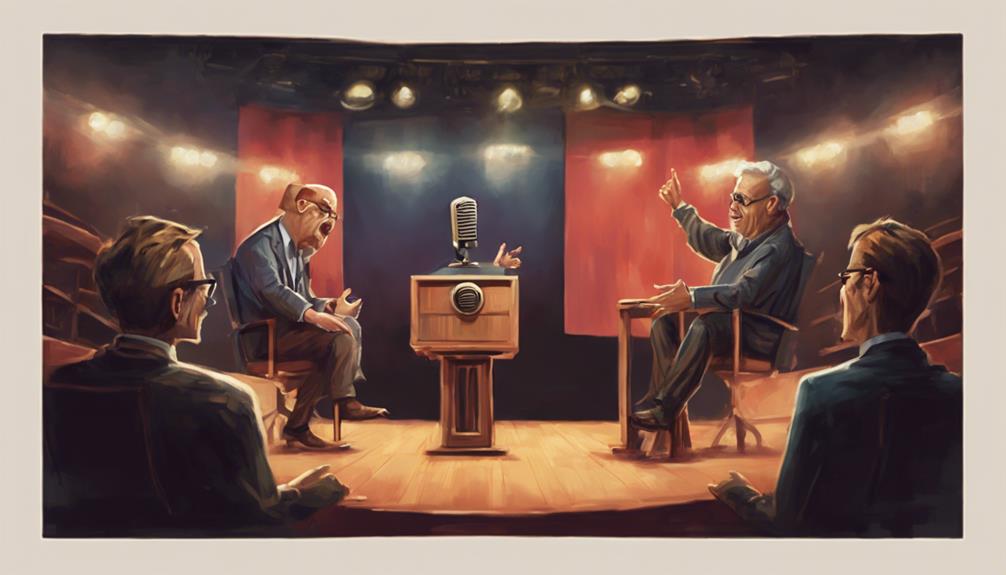When you speak in public, remember to keep it fresh by sharing your own stories and checking your material with tools like Grammarly. Validating quotes and facts from trustworthy sources keeps your speech original. Use precise match searches and ask for permission before referencing others' work. Integrate improvisation to engage with your audience authentically. Properly crediting your sources is crucial to avoiding plagiarism accusations. These simple steps will guarantee your speech stands out for all the right reasons.
Key Takeaways
- Incorporate personal stories to enhance originality.
- Use plagiarism checker tools for content authenticity.
- Obtain permission before using external content.
- Practice improvisation to balance prepared material.
- Attribute sources properly to avoid plagiarism risks.
Plagiarism Prevention Strategies
To effectively prevent plagiarism in your public speaking engagements, consider implementing various strategies to ensure originality and authenticity in your speeches. Utilize plagiarism checker tools like Grammarly or Turnitin to verify that your content is free from any copied material.
Incorporating personal stories and experiences into your speeches not only adds authenticity but also guarantees unique content on stage. Taking detailed notes during your research process is essential to distinguish your original ideas from borrowed sources, thereby reducing the risk of unintentional plagiarism.
Additionally, verify all quotes and facts from original sources to accurately credit them in your presentation. For high-profile speeches, using online originality checkers can provide an extra layer of protection against unintentional plagiarism.
Google Your Topics

When ensuring uniqueness and authenticity in your public speaking engagements, start by confirming your speech topics in advance through a quick Google search.
Researching your topics using Google can help you maintain authenticity and avoid unintentional plagiarism. By refraining from researching similar topics before preparing your talk and saving links for later review, you can track your research sources effectively.
To prevent accidental plagiarism, it's essential to steer clear of reading or watching others' work on the same topics. Conducting thorough searches on Google won't only help you stay organized but also guarantee that your content creation process remains innovative.
Ask for Permission

When incorporating others' work into your speeches, it's essential to obtain written consent, respect intellectual property, and secure proof of permission.
Requesting permission shows your commitment to upholding ethical standards and avoiding unintentional plagiarism.
Make sure to always ask for permission, whether you're using a quote, image, or idea in your public speaking engagements.
Obtain Written Consent
Seeking written consent from authors or creators before referencing their work in your speech is necessary to safeguard yourself legally. Obtaining written permission serves as an essential step in avoiding plagiarism and respecting intellectual property rights.
By requesting approval in writing, you create a documented record that demonstrates your adherence to ethical standards. This process not only protects you from potential legal issues but also enhances the transparency of your speech.
Having written consent from the original creators gives you the authorization needed to incorporate their work into your presentation responsibly. It's a proactive measure that showcases your commitment to upholding the integrity of your content.
Respect Intellectual Property
To respect intellectual property rights and avoid plagiarism in your public speaking, it's crucial to request permission before referencing others' work. Seeking approval not only shows your dedication to ethical practices but also helps you steer clear of potential legal issues.
By securing permission in advance, you demonstrate respect for the creators of the content you intend to utilize and uphold the integrity of your speech.
Always remember to acknowledge your sources and request permission to incorporate their work in your speeches. Not only does this reflect positively on your professionalism, but it also guarantees that you're upholding ethical standards in your public speaking engagements.
Prioritize seeking approval before including any external content to ensure that you're respecting intellectual property rights and giving credit where it's deserved. By doing so, you not only shield yourself from allegations of plagiarism but also highlight your integrity as a speaker.
Secure Proof of Permission
To ensure that you avoid any potential legal issues related to plagiarism in your public speaking, remember to always obtain written consent or permission from original sources before referencing their work.
Obtaining permission is vital in protecting yourself from accusations of plagiarism and intellectual property infringement. By seeking permission in advance, you not only demonstrate professionalism but also uphold ethical standards by respecting the rights of content creators.
Having documented proof of permission not only guarantees transparency but also enhances your credibility during presentations. It's crucial to prioritize obtaining permission as a necessary step in your research process to maintain integrity and responsibility in your public speaking engagements.
Exact Match Searches

When conducting exact match searches, remember to use quotation marks around your key phrases to guarantee their uniqueness.
By verifying your key terms this way, you can prevent any unintentional duplication in your speeches.
This method is essential for maintaining the originality and credibility of your content.
Quotation Marks Usage
By utilizing quotation marks in search engines like Google, you can effectively verify the originality of key terms and phrases in your public speaking presentation.
Using quotation marks guarantees that your content remains distinct and isn't accidentally similar to existing material. This practice aids in confirming the uniqueness of your content, ultimately reducing the risk of unintentional plagiarism in your speeches.
By employing exact match searches with quotation marks, you enhance your credibility by avoiding duplicated phrases or ideas in your discourse.
Verifying your content through quotation marks is an essential step to prevent accidental plagiarism and uphold originality in your research and content creation.
Verifying Key Terms
Utilizing precise match searches with quotation marks enhances the originality of your public speaking content by verifying key terms and phrases effectively. By conducting these searches, you guarantee that your presentation contains unique content and is free from duplicated phrases or ideas. This proactive approach not only helps prevent unintentional plagiarism but also enhances the credibility of your speech.
When you use precise match searches, you can confirm the uniqueness of your content by checking for similar phrases or ideas in existing sources. This verification process is essential in maintaining the originality and authenticity of your speeches.
Preventing Duplicated Phrases
Assure the originality of your public speaking content by conducting precise match searches using quotation marks to prevent duplicated phrases.
To avoid unintentional plagiarism, it's essential to verify the uniqueness of your speech content. By checking for similar phrases through precise match searches, you can guarantee that your ideas are authentic and original.
Preventing duplicated phrases in your presentations not only enhances your credibility but also demonstrates your commitment to delivering fresh and innovative content to your audience.
Utilizing precise match searches will help you maintain the integrity of your speech and avoid any accusations of plagiarism.
Speech Planning Tips

When planning your speech, make sure that you dedicate sufficient time to refine and practice your delivery to minimize the risk of unintentional plagiarism. Here are some speech planning tips to help you stay original and engaging:
- Plan in Advance: Take the time to outline your speech, ensuring a logical flow of ideas and a clear message.
- Practice Your Delivery: Rehearse your speech multiple times to become familiar with the content and delivery style.
- Balance Scripted Content and Improvisation: Mix prepared material with spontaneous speaking to keep your presentation authentic.
- Seek Feedback: Share your speech with colleagues or mentors to receive constructive criticism and improve its quality.
Understanding Plagiarism Risks

Understanding the risks of plagiarism in public speaking is vital for maintaining integrity and credibility as a speaker. Plagiarism risks arise when one fails to properly attribute sources or uses someone else's words or ideas without permission.
Cultural differences can further complicate the issue, as what's considered plagiarism in one culture may not be perceived as such in another. It's important to be aware of these differences and make sure that your speeches align with the expectations of your audience.
Moreover, unintentional plagiarism can be just as damaging as intentional plagiarism. Even if you didn't mean to plagiarize, failing to give credit where it's due can harm your reputation as a speaker.
To mitigate these risks, always cite your sources accurately and consistently. By maintaining originality in your speeches and properly acknowledging the work of others, you not only uphold ethical standards but also enhance your personal growth and audience engagement.
Implications for Speakers

Considering the risks and importance of originality in public speaking, speakers must navigate the implications of plagiarism with care and ethical awareness.
When addressing the implications of plagiarism, it's vital to keep the following points in mind:
- Plagiarism Consequences: Plagiarism can severely damage your credibility as a speaker and diminish the impact of your message on the audience. Always aim to create original content to maintain trust and respect.
- Crediting Others: Properly crediting sources isn't only a sign of respect for the original creators but also a way to avoid plagiarism accusations. Be transparent about the sources you use in your speech.
- Prevention Strategies: Incorporating personal anecdotes, taking detailed notes during research, and accurately quoting sources are effective strategies to prevent unintentional plagiarism. Stay diligent in distinguishing your ideas from those of others.
- Ethical Speech Practices: Uphold ethical standards by always attributing ideas and giving credit where it's due. By practicing ethical speech, you can enhance your reputation as a speaker and build a strong rapport with your audience.
Responsible Speech Goals

To set a strong foundation for your public speaking, prioritize responsible speech goals that emphasize ethical communication standards and using inclusive language practices.
Responsible speech goals involve setting ethical communication standards, promoting diversity, and using inclusive language to engage diverse audiences. By fostering appreciation for differences, introducing multicultural issues, and building rapport with listeners, you can create a more inclusive and respectful speaking environment.
Inclusive language practices, like using inclusionary pronouns and avoiding sexist language, play an essential role in making everyone feel welcomed during your speeches. Responsible speech goals also include steering clear of hate speech, promoting understanding, and advocating for social justice to spark positive societal changes.
Promoting Diversity

Promote diversity in your public speaking by appreciating and showcasing a variety of perspectives and voices. When you actively promote diversity in your speeches, you create a more inclusive and engaging environment for your audience.
Here's how you can effectively promote diversity:
- Use inclusive language: Incorporate words and phrases that welcome individuals from all backgrounds, making everyone feel valued and respected.
- Address multicultural issues: By discussing topics that reflect the experiences of diverse communities, you can raise awareness and foster understanding among your listeners.
- Engage diverse audiences: Tailor your speeches to connect with a wide range of people, helping to dispel stereotypes and promote empathy and inclusivity.
- Support underrepresented voices: Give a platform to individuals whose perspectives are often marginalized, amplifying their stories and contributions in your public speaking engagements.
Frequently Asked Questions
How to Avoid Plagiarism in Public Speaking?
To avoid plagiarism in public speaking, you should use plagiarism checker tools, share personal stories, give proper credit, avoid similar content, and seek feedback. These steps will help you guarantee your speech is original and plagiarism-free.
What Is the Basic Rule for Avoiding Plagiarism as a Public Speaker?
To avoid plagiarism as a public speaker, always give credit to original sources. Use personal stories for authenticity. Take detailed notes to separate your ideas from borrowed ones. Verify with plagiarism checkers and include citations for credibility.
In What Stage Should You Begin the Process of Avoiding Plagiarism?
You should begin the process of avoiding plagiarism during the initial research phase of your speech preparation. Confirm originality, save relevant links, seek permission, conduct exact match searches, and plan your speech in advance.
How Do You Avoid Plagiarism in the Note Taking Stage of Writing?
When taking notes, guarantee originality by clearly differentiating between your ideas and borrowed content. Use specific formatting for direct quotes, record sources meticulously, and separate your interpretations. Color-code or label notes for easy referencing.
How Can Public Speakers Ensure They Are Speaking Their Own Truth and Avoiding Plagiarism?
Public speakers can ensure they are speaking their own truth and avoiding plagiarism in public speaking by thoroughly researching their topics, citing sources when necessary, and always attributing quotes or ideas to their original sources. Honesty and integrity in their speech are crucial to maintaining credibility with their audience.
Conclusion
So, remember, when it comes to public speaking, originality is key. Avoiding plagiarism not only protects your credibility, but also shows respect for others' work.
So next time you're preparing a speech, make sure to do your research, ask for permission when needed, and always endeavor to bring your own unique perspective to the stage.
After all, isn't it ironic how being authentic can set you apart in a world full of copycats?









